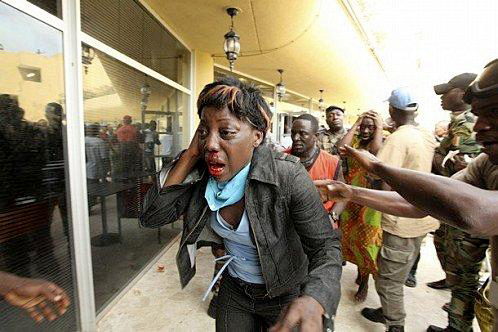
On 11 April 2011, former President of Côte d’Ivoire (Ivory Coast) Laurent Gbagbo was apprehended by French special forces at an underground bunker in the presidential residence in Abidjan. Gbagbo, his wife Simone, son Michel and 50 close associates were handed over to the ‘rebel’ forces of presidential rival Alassane Ouattara and paraded on TV. French intelligence knew the exact location of bunker. Ouattara will be installed as president by France.
France has signalled to its fellow imperialist rivals that it intends to keep hold of its neo-colony in West Africa, a major source of oil. With Britain and the US established in Liberia, Nigeria, Ghana and Sierra Leone, and with China increasing its investments in Africa as a whole, France cannot afford to give way to its rivals and is prepared to carry out atrocities to keep its foothold in this resource-rich region. Gbagbo and Ouattara are the playthings of the imperialists.
Economic hub
Côte d’Ivoire is the world’s largest cocoa producer (with 34% of world supply), it is also a major source of coffee and timber, and a growing exporter of gold and oil. 68% of its population work in the agricultural sector which contributes 28% to GDP. It is a key economic hub of oil-rich West Africa. It accounts for 40% of GDP in the regional West African Economic and Monetary Union (UEMOA).
Just four French companies control transport, water, electricity and communications; and three others dominate banking in Côte d’Ivoire. (Boubacar Boris Diop, Le Monde diplomatic, April 2005) France and the EU dominate exports. However, there is increasing challenge from the US, India and China. In 2008, the US declared ‘Côte d’Ivoire is open for business.’
In 2005 Côte d’Ivoire became an oil producer. Between 2007 and 2009, there were several major oil discoveries off the West African coast. In June 2007, British Tullow Oil discovered oil in the deep coastal waters of Ghana; in September 2009, US company Anadarko Petroleum discovered oil off Sierra Leone. A ‘new oil frontier’ extending from Senegal to Gabon, with significant resource potential was hailed (International Energy Outlook 2010, US Energy Information Administration (EIA) eia.doe.gov, 27 July 2010). With an era of perpetual war predicted for the Middle East, Africa is being looked at as a major alternative source of energy for the imperialist economies, and the rivalry primarily between France and the US has been at the heart of the Ivorian crisis. The Gbagbo administration had tried to break the French stranglehold over the economy. France had therefore decided that he should be removed. Up to 2010, the US still backed Gbagbo; he is an evangelical Christian close to right-wingers Pat Robertson and US senator Jim Inhofe.
France shows its hand
Côte d’Ivoire had been divided into a ‘rebel’-held north and a government-run south since 2003, an untenable situation for the imperialists. The World Bank, IDA and IMF had agreed $1.3bn in loans and $3bn in ‘debt relief’ to the country conditional on political ‘normalisation’. Under pressure, presidential elections. postponed six times since 2005, were finally held in October 2010. The second-round vote on 28 November was disputed after both Gbagbo and Ouattara claimed the presidency, each accusing the other of electoral fraud. Such fraud was confirmed by African Union election observers. Since Ouattara claimed 54% against 46% for Gbagbo, the UN backed Ouattara with the EU and US falling in line.
As negotiations, threats, arm–twisting and lobbying failed, Gbagbo and Ouattara headed rival administrations and fought to control key financial institutions. Major US, British and French banks closed their offices. Hotels and restaurants collapsed. Mercenaries and death squads were used by both sides to terrorise civilian populations thought to support their rivals. Ouattara’s Prime Minister and military leader of the ‘rebel’ Republican Forces, Guillaume Soro, openly called for outside military intervention, and warned of severe penalties for those dealing with Gbagbo. The UN and EU imposed sanctions. France, Canada, Britain, the EU and the UN no longer recognised Gbagbo’s ambassadors. On 17 December 2010, French president Sarkozy ordered Gbagbo to leave ‘by the end of the week…The president of Côte d’Ivoire’s name is Alassane Ouattara’. The US Ambassador Phillip Carter said ‘we stand with President Ouattara’.
Having failed for four months to get rid of Gbagbo, France resorted to brute force in April. President Nicolas Sarkozy declared that the UN Secretary General Ban Ki-moon had requested France’s military participation and that the assault on Abidjan was undertaken according to a Security Council mandate. But the UN Mission in Côte d’Ivoire (UNOCI) is mostly made up of French military: France is the UN in Côte d’Ivoire.
On 3 April French forces occupied Abidjan airport, increased its numbers by 300 to 1,650 soldiers on the pretext of protecting UN employees and the 12,000 French expatriates. French Puma helicopters bombed at least two military bases and the presidential residence and palace where Gbagbo and his family and supporters were hunkered down. This attack was coincidentally carried out just as 9,000 Ouattara fighters prepared a ‘final assault’ on Abidjan, the capital city.
The intervention by France and the military push by it proxies has seen over 1,500 killed and over one million people fleeing their homes in Abidjan alone. Between 800 and 1,000 people including other west African nationals from Burkina Faso, Guinea, Mali, Senegal and Togo, were killed in the western regions around the towns of Guiglo, Duékoué and Blolequin. The killings have been blamed on militia loyal to Ouattara, although predictably French media such as France24.com has claimed there is ‘little proof of excesses committed by pro-Ouattara forces’.
Ouattara’s victory is proof that French imperialism remains a powerful force in strategic areas of west Africa.




